新概念第二册50课课件.
合集下载
Lesson50Takenforaride(课件)新概念英语第二册

prefer v. 更喜欢
•prefer to do sth . •prefer doing sth. •prefer sth. to sth . 比起...更喜欢… •prefer to do sth (rather) than do sth. • 宁愿做……而不愿做…… •prefer doing sth. to doing sth . • 宁肯做……而不肯做……
been improve. 5.The bus can carry fifty____(乘客) 6.We can see a fine ___(景色)of the West Lake from
the top of the mountain.
Where did the writer want to go?
• Is he one of your best friends ? In that case ,you may invite him .
• In that case you'll have to clear yourself. • In this case, let's start earlier.
行,指挥,传导 •conduction n . 传导
view n. 景色,尤其自然美景;观点 •a view of … 一个……美景
view about /on sth. 关于……的观点 in one’s view 依某人看 in one’s opinion 在某人看 in view of 鉴于
eg: _In__v_ie_w__o_f_ what you said , I intent to go for a ride . _I_n_h_i_s_v_i_e_w, he can run for the governor . This is a view __a_b_o_u__t _ English .
新概念英语NCE2_Lesson50(共50页)课件

eg: _In__v_ie_w__o_f_ what you said , I intent to go for a ride . _I_n_h_i_s_v_i_e_w, he can run for the governor . This is a view __a_b_o_u__t _ English .
conductor n. 指挥家,售票员,导体 ,列车长
• conductress 女售票员 • conduct v. 组织,安排,实施,执
行,指挥,传导 • conduction n . 传导
view n. 景色,尤其自然美景;观点 • a view of … 一个……美景
view about /on sth. 关于……的观点 in one’s view 依某人看 in one’s opinion 在某人看 in view of 鉴于
Do exercises: 1.He asks the ______(售票员)where he must get off
for the zoo. 2.We went for a _____(旅行)last Sunday afternoon. 3.They are planning for their ______(远足)next week. 4.I will _______(期待)to hear that your work has
• ‘It doesn't matter,’I said.‘I'll get off here.’
• ‘We're going back now,’ said the conductor.
• ‘Well, in that case, I prefer to stay on the bus,’I answered.
conductor n. 指挥家,售票员,导体 ,列车长
• conductress 女售票员 • conduct v. 组织,安排,实施,执
行,指挥,传导 • conduction n . 传导
view n. 景色,尤其自然美景;观点 • a view of … 一个……美景
view about /on sth. 关于……的观点 in one’s view 依某人看 in one’s opinion 在某人看 in view of 鉴于
Do exercises: 1.He asks the ______(售票员)where he must get off
for the zoo. 2.We went for a _____(旅行)last Sunday afternoon. 3.They are planning for their ______(远足)next week. 4.I will _______(期待)to hear that your work has
• ‘It doesn't matter,’I said.‘I'll get off here.’
• ‘We're going back now,’ said the conductor.
• ‘Well, in that case, I prefer to stay on the bus,’I answered.
新概念英语第二册50课课件
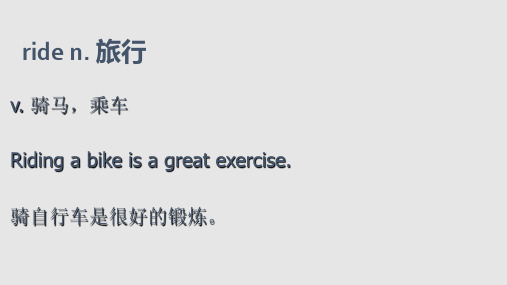
谢谢您的观看!
the top of the mountain. 5.The bus can carry fifty_____(乘客).
expect realize shock passenger
v.期待,预料 vt. 认识到,实现,了解 n.震惊 n.乘客
1.love/like doing sth.喜爱/喜欢做某事 2.travel in the country 在乡间旅行 3.lose one's way=get lost 迷路 4.go on an excursion 做一次短距离的旅行 5.take sb. some time花费某人多少时间 6.longer than I expected 比我预期的时间要长 expect v.
He has an excursion into science.
conductor n. 售票员 conduct v. 组织,安排,实施,执行,指挥,传导 conductor n.指挥家 导体 列车员
conductress n.女售票员 passenger n. 旅客;乘客 conduction n. 传导
11.forget to do 忘了做某事 forget doing忘了做过某事
12.put sb. off 让...下车 13.in that case 要是那样的话,既然如此 14.prefer to do sth. 宁可做某事 15.stay on the bus 留在车上
摘要写作: 1.Woodford Green. The conductor promised to tell him where to get off. 2.Yes,they did. The writer asked if they were at Woodford Greeen.
新概念二册50课课件
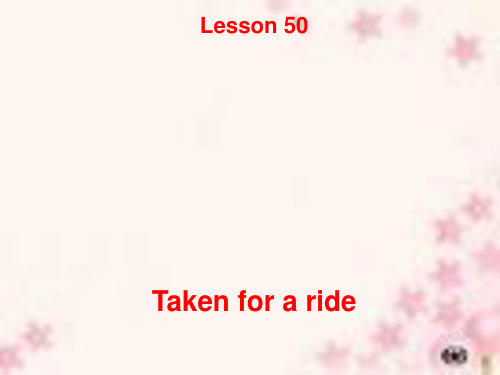
'I'm going to Woodford Green,' I said to the conductor as I got on the bus, 'but I don't know where it is.'
“我要去伍德福德草地,”我一上车就对售票员说,“但我不知道它在那 儿。”
get on 上车(大车) 下车 上车(小车)
I sat in the front of the bus to get a good view of the countryside. After some time, the bus stopped. Looking round, I realized with a shock that I was the only passenger left on the bus.
• loose adj. 松动的,松的,松开的 松动的,松的,
• Serveral screws have come loose. (come loose,松了(系动词 ,松了(系动词+adj.) ) • The handle of this suitcase is very / has come loose.
• • •
【Key structures】 】 表示习惯性动作 表示状态、感觉、情绪、 表示状态、感觉、情绪、精 神活动的动词appear, 神活动的动词 , appreciate,believe,feel, , , , forget,hear,know,like, , , , , look,notice,remember, , , , resemble,see,think, , , , understand,belong to, , , consist of,contain, , , desire,detest,dislike, , , , hate,hope,love,matter, , , , , mean,mind,need,want, , , , , wish常用于一般现在时而不 常用于一般现在时而不 用于进行时
新概念英语第二册第50课课件

• 1.-- What's his brother?
• -- He is a teacher. He ____ maths at a school.
• A. teach
B. teachs
• C. taught
D. teaches
• 2. Those papers _______ me.
• A. is
• A. spent
B. will spend C. has spent
D. spends
• 3. Now my father _____ his bike to work every day instead of driving. 【上海】
• A. ride
B. rode
C. rides
D. will ride
'I'll tell you where to get off.' answered the conductor.
I sat in the front of the bus to get a good view of the countryside.
After some time, the bus stopped. Looking round, I realized with a shock that I was the only passenger left on the bus. 'You'll have to get off here,' the conductor said. 'This is as far as we go.’ 'Is this Woodford Green?' I asked. 'Oh dear,' said the conductor suddenly. 'I forgot to put you off.’ 'It doesn't matter,' I said. 'I'll get off here.’ 'We're going back now,' said the conductor. 'Well, in that case, I prefer to stay on the bus,' I answered.
新概念二 第50课课件
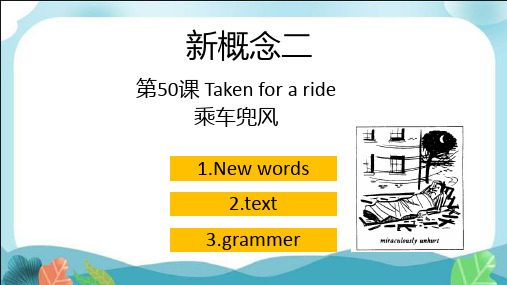
新概念二
第50课 Taken for a ride 乘车兜风
1.New words 2.text
3.grammer
New words and expressions
•N1e. rwidwe [orradids] ann.旅d行expressions
• 2. excursion [ik'skə:ʃən] n.远足 • 3. conductor [kən'dʌktə] n.售票员 • 4. view [vju:] n.景色
课文注释
2. I'll tell you where to get off.我会告诉您在哪儿下车。 (2)get off与get on为一对反义词, 分别表示“(从汽车等上)下来”和“登上(汽车、火车等)”, off与on既可以作副词又可以作介词: No one got on/ off(the bus)at the last bus stop. 在上个公共汽车站没有人上/下车
课文注释
2. I'll tell you where to get off.我会告诉您在哪儿下车。 (1)where to get off是一个“连接副词+不定式短语”结构,其中的连接副词通常为疑 问副词。这种结构接近一个名词从句,常 在tell, show, know, decide, teach, learn, wonder, remember, explain等动词后作宾语: Did Mary tell you when to come? 玛丽告诉你什么时候来了吗? Do you know how to open the box? 你知道如何打开这盒子吗? He didn't tell me where to put those books. 他没有告诉我把那些书放在哪里。
第50课 Taken for a ride 乘车兜风
1.New words 2.text
3.grammer
New words and expressions
•N1e. rwidwe [orradids] ann.旅d行expressions
• 2. excursion [ik'skə:ʃən] n.远足 • 3. conductor [kən'dʌktə] n.售票员 • 4. view [vju:] n.景色
课文注释
2. I'll tell you where to get off.我会告诉您在哪儿下车。 (2)get off与get on为一对反义词, 分别表示“(从汽车等上)下来”和“登上(汽车、火车等)”, off与on既可以作副词又可以作介词: No one got on/ off(the bus)at the last bus stop. 在上个公共汽车站没有人上/下车
课文注释
2. I'll tell you where to get off.我会告诉您在哪儿下车。 (1)where to get off是一个“连接副词+不定式短语”结构,其中的连接副词通常为疑 问副词。这种结构接近一个名词从句,常 在tell, show, know, decide, teach, learn, wonder, remember, explain等动词后作宾语: Did Mary tell you when to come? 玛丽告诉你什么时候来了吗? Do you know how to open the box? 你知道如何打开这盒子吗? He didn't tell me where to put those books. 他没有告诉我把那些书放在哪里。
新概念二 Lesson50 课件

Discussion
trip travel journey voyage flight tour 的区别
1. journey指从一地到另一地,通常指陆地上的远距离“旅行”,有时也可以表示经常走的或长 或短的“路程”。只作名词。例如: I took a journey from Beijing to Shanghai last year. -How long is your journey to school? --Only about 10 minutes. 2. voyage主要指远距离的水上旅行,也可以指空中旅行意思为“航海、航空、航行”等。只作 名词。例如: She usually gets seasick during the voyage. 3. trip 一般指时间短、距离近的“旅行、远足”,也可以指长途旅行。在非正式用语中可代替 journey。只作名词。例如: I will be on a trip to / journey to the south next summer holiday. 4. tour 着重指旅行线路比较曲折,常表示“(周游各地的)参观、访问、(巡回)旅游、视察、 购物、演出”等意思。可作动词和名词。例如: I will tour the world in the future. / My father has gone down-town on a shopping tour. 5. travel作“旅行、游历”解,一般表示从一地到另一地旅行这一总的概念。常指长时间、远 距离的“旅行”。尤指出国旅行。可作动词和名词。其复数形式意思为“旅游笔记”、“游 记”。例如: At present, many people are fond of travel in their spare time. 6. flight 主要指空中飞行
新概念英语第二册第50课-Taken-for-a-ride-乘车兜风PPT幻灯片
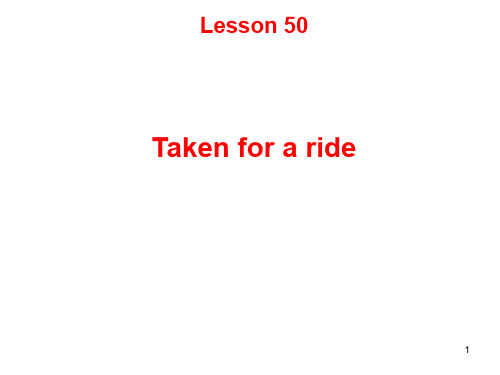
sometime (过去或将来的)某一时刻 eg. I hope to go to Beijing sometime soon.
sometimes 有时 eg. Sometimes I work in the day and sometimes at night.
some times 好几次
21
eg. My uncle has been to London some times
countrycountrysideruralareacountrycountrysideruralarea乡间乡间cityurbanareacityurbanarea城市城市loseoneswaygetlostloseoneswaygetlost迷路迷路loseonesjobloseonesjob丢掉工作丢掉工作loseonestemperloseonestemper发脾气发脾气loseweightloseweight减肥减肥14excursionrecentlyexcursionrecentlymytriptookmelongerthanexpectedmytriptookmelongerthanexcursiongoexcursionhaveexcursionexcursion作一次短距离的旅行作一次短距离的旅行15进行为某一目的而去进行为某一目的而去i?llgoholidaynextmonth
16
• sb. spend some time (in) doing sth. I spent a month learning English. • sb. spend some time on sth. 金钱上的花费cost, pay for sth. • than I expected 比我所预料的(口 语) You are more beautiful than I expected. • than I thought 比我原以为的 The English class took me longer than I thought.
新概念英语第二册50课(课堂PPT)

• I will tour the world in the future. • My father has gone down-town on a
shopping tour.
6
• 5. travel作“旅行、游历”解,一般表示从 一地到另一地旅行这一总的概念。常指长 时间、远距离的“旅行”。可作动词和名 词。其复数形式意思为“旅游笔记”、 “游记”。
3. miss v. 想念,错过 eg: We must hurry or we'll miss the train. I miss you very much.
lost missing gone
﹡lost 表示“丢失”,含有失去后难以找回的意味 ,在句中可作定语,表语和补语。 eg: The parents found the lost child at last. His elder brother was lost at sea.
(2) n. 视野,视界 come into view 看得见 eg:The plane soon went out of view.
(3) n. 看法,想法,意见 ● in one's view=in one's opinion eg: In my view, we should go head. ● viewpoint=point of view 观点,立场,意见
★view (1)n. 景色 eg:The view of the top of hill is wonderful.
★ 辨析: ● view 常指从远处或高处看到的 ● landscape (陆地的)景观,景象 ● scene 可数 (view as seen by a spector) ● scenery 不可数(general natural features of an area, eg:mountain..) ● sight 可以指场景、眼前看到的景观,也可以 指名胜、风景,只是在表示后者的含义 时,必须要用复数。 eg:a sad sight悲惨的场景 see the historical sights of London 游览伦敦的名胜古迹
shopping tour.
6
• 5. travel作“旅行、游历”解,一般表示从 一地到另一地旅行这一总的概念。常指长 时间、远距离的“旅行”。可作动词和名 词。其复数形式意思为“旅游笔记”、 “游记”。
3. miss v. 想念,错过 eg: We must hurry or we'll miss the train. I miss you very much.
lost missing gone
﹡lost 表示“丢失”,含有失去后难以找回的意味 ,在句中可作定语,表语和补语。 eg: The parents found the lost child at last. His elder brother was lost at sea.
(2) n. 视野,视界 come into view 看得见 eg:The plane soon went out of view.
(3) n. 看法,想法,意见 ● in one's view=in one's opinion eg: In my view, we should go head. ● viewpoint=point of view 观点,立场,意见
★view (1)n. 景色 eg:The view of the top of hill is wonderful.
★ 辨析: ● view 常指从远处或高处看到的 ● landscape (陆地的)景观,景象 ● scene 可数 (view as seen by a spector) ● scenery 不可数(general natural features of an area, eg:mountain..) ● sight 可以指场景、眼前看到的景观,也可以 指名胜、风景,只是在表示后者的含义 时,必须要用复数。 eg:a sad sight悲惨的场景 see the historical sights of London 游览伦敦的名胜古迹
新概念英语第二册Lesson50(共28张PPT)

•
12、越是无能的人,越喜欢挑剔别人 的错儿 。202 1/8/7 2021/ 8/720 21/8/7 Saturday, August 07, 2021
•
13、知人者智,自知者明。胜人者有 力,自 胜者强 。202 1/8/7 2021/ 8/720 21/8/7 2021/ 8/78/ 7/202 1
•
9、有时候读书是一种巧妙地避开思 考的方 法。202 1/8/7 2021/ 8/7Sa turda y, August 07, 2021
•
10、阅读一切好书如同和过去最杰出 的人谈 话。20 21/8/ 72021 /8/72 021/8 /78/7 /2021 8:02:21 PM
•
11、越是没有本领的就越加自命不凡 。202 1/8/7 2021/ 8/720 21/8/7 Aug-2 17-Au g-21
• than I expected【口语】比我所预料
• The question is easier than I expected. • You are more beautiful than I expected. • You are better than I expected.
• than I thought 比我原以为的
•
17、一个人即使已登上顶峰,也仍要 自强不 息。20 21/8/ 72021 /8/72 021/8 /7202 1/8/7
谢谢观赏
You made my day!
我们,还在路上……
in that case = if that happens 若是那样的话
prefer to do sth. 宁可做某事
prefer A to B.
比起B,更喜欢A
新概念英语第2册课件Lesson50(共40页)
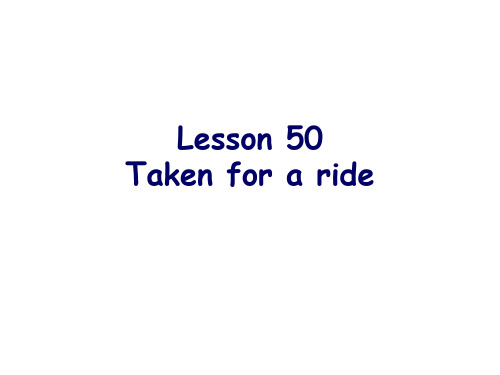
Lesson 50 Taken for a ride
Warming up
Work in pairs. Do this quiz and find out how much you know about the United Kingdom.
1. Can you name the major tourist areas of Xiamen
First let's watch the vedio and try to figure out the question?
Why did the writer not get off the bus at the Woodford Green?
Text Understanding
language points
1. I love travelling in the country, but I don't like losing my way.
➢ love/like doing sth 喜欢做某事 (强调一种习惯) eg. I love having dinner with you, but I don't like
2) v. 骑,乘(马,自行车,汽车等) eg. ride a pony, bicycle
New words and expressions
exursion n. 远足,短途旅行
trip
eg. weekend excursion /trip
a day excursion/trip
shopping excursion/trip
• conduct 1) n. 行为,品行,举止 eg. a man of good conduct
shameful conduct A Code of Conduct for Students
Warming up
Work in pairs. Do this quiz and find out how much you know about the United Kingdom.
1. Can you name the major tourist areas of Xiamen
First let's watch the vedio and try to figure out the question?
Why did the writer not get off the bus at the Woodford Green?
Text Understanding
language points
1. I love travelling in the country, but I don't like losing my way.
➢ love/like doing sth 喜欢做某事 (强调一种习惯) eg. I love having dinner with you, but I don't like
2) v. 骑,乘(马,自行车,汽车等) eg. ride a pony, bicycle
New words and expressions
exursion n. 远足,短途旅行
trip
eg. weekend excursion /trip
a day excursion/trip
shopping excursion/trip
• conduct 1) n. 行为,品行,举止 eg. a man of good conduct
shameful conduct A Code of Conduct for Students
新概念英语第二册lesson50(共24张PPT)
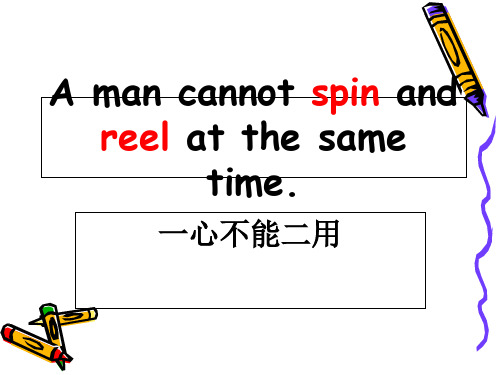
Article focuses
1. I love travelling in the country, but I don't like losing my way.
a. love/like to do sth love/like doing sth
b. in the country=in the countryside 在乡下 c. lose one’s way 迷路
2. We can see a fine __vi_e_w__ of the village from the top of the mountain.(景色)
3. We had to _g_e_t_o_f_f_ the bus because its engine had gone wrong. (下车)
比起…更喜欢…,喜欢…而不喜欢…
prefer doing …to doing… 比起做…更喜欢做…
prefer to do … rather than do … 宁愿做…而不愿做…
eg: ·I prefer English to math.
·He prefers riding a bike to driving.
'Oh dear,' said he conductor suddenly.
'I forgot to put you off. '
a. forget to do sth
忘了去做某事
forget doing sth
忘了做过某事
remember to do sth 记得去做某事
remember doing sth 记得做了某事
a. in that case 如果那样的话 in this case 在这种情况 in any case 不管怎么样
新概念第二册50课课件(共39张PPT)

prefer sth to sth 表示 “宁要…而不要”,to是介词:
He prefers cats to dogs. 他喜欢猫,而不喜欢狗。
prefer to do sth & prefer doing sth 见前 (love to do sth & love doing sth)
本课必须掌握的词组:
Conductor 是在这里是 “售票员” 的意思,它也可以用 来表示 “音乐指挥”。 get on与 get off为一对反义词,分别表示“(从汽车等上) 下来”和“登上(汽车、火车等)”,on与off既可以作 副词又可以作介词:
4 .‘I'll tell you where to get off,’ Answered the
lose one’s way look around go on an excursion with a shock in the front of as far as get a good view of put sb off after some time in that case
复述课文:
Tell the story 1 love-in the country-don't like losing 2 excursion recently-Woodford Green 3 by bus-didn't know where 4 Conductor promised-tell-get off 5 sat-front of the bus-view so-stayed on the bus 6 bus stopped-shock-only passenger 7‘get off here’-said-‘as far as.’ 8 forgotten-put me off 9 I decided-get off-but-conductor told me
He prefers cats to dogs. 他喜欢猫,而不喜欢狗。
prefer to do sth & prefer doing sth 见前 (love to do sth & love doing sth)
本课必须掌握的词组:
Conductor 是在这里是 “售票员” 的意思,它也可以用 来表示 “音乐指挥”。 get on与 get off为一对反义词,分别表示“(从汽车等上) 下来”和“登上(汽车、火车等)”,on与off既可以作 副词又可以作介词:
4 .‘I'll tell you where to get off,’ Answered the
lose one’s way look around go on an excursion with a shock in the front of as far as get a good view of put sb off after some time in that case
复述课文:
Tell the story 1 love-in the country-don't like losing 2 excursion recently-Woodford Green 3 by bus-didn't know where 4 Conductor promised-tell-get off 5 sat-front of the bus-view so-stayed on the bus 6 bus stopped-shock-only passenger 7‘get off here’-said-‘as far as.’ 8 forgotten-put me off 9 I decided-get off-but-conductor told me
- 1、下载文档前请自行甄别文档内容的完整性,平台不提供额外的编辑、内容补充、找答案等附加服务。
- 2、"仅部分预览"的文档,不可在线预览部分如存在完整性等问题,可反馈申请退款(可完整预览的文档不适用该条件!)。
- 3、如文档侵犯您的权益,请联系客服反馈,我们会尽快为您处理(人工客服工作时间:9:00-18:30)。
loose adj. 松动的,松的,松开的
• Serveral screws have come loose. (come loose,松了(系动词+adj.) • The handle of this suitcase is very / has come loose.
miss
v. 怀念, 思念, 错过,未能……,缺(课等),惦念,想念
• Hurry or you’ll miss the train. • I missed my English lesson. • missing adj. 不见了的 • sth. is lost = sth. is missing • missing boy 失踪了的孩子(不能用 “lost” )
• 【Special Difficulties】
Lose, Loose, Miss. lose vt. 失去,丧失,遗失,丢失
• Roy has lost his job again. • She lost her parents when she was sixteen. • If you bet on that horse you will lose your money. (bet on sth 就…… 打赌)
静态动词
• 但是当现在进行时与频度副词 always, constantly,continually, forever等连用时,此时 静态动词也是可以有进行时态的,因为此时表示 的是带有一定感情色彩的,如令人不满、厌烦或 关心、赞叹的事。 • e.g. You're always seeing something strange. • I'm continually forgetting people's name. • He is being polite today. • ‘I think you are cool.’ – state verb meaning ‘in my opinion’. ‘I am thinking about buying a motorbike.’ – action verb meaning ‘considering’
2. 第26课, 一般现在时的用法: 当要表达一个永恒不变的或是有规律的动作时,也 就是用于普遍性真理时,我们必须用 一般现在时。 比如: The earth goes round the sun.地球围绕太阳转。
静态动词
• 静态动词表示一种静止状态, • 包括“存在”和“拥有”的动词,如 be, have, own, contain, belong, exist, hold(容纳)等表示特征或事物关 系的词;表示度量的动词,如cost, weigh, measure等; 表示五官感觉的动词,如see, hear, taste, smell, feel等; 以及 表示心理状态的动词,如 believe, think, know, remember, forget, understand, love, like ,hate, detest(讨 厌)等。 • 例如: • The house belongs to his father. 这幢房子属于他的父亲。 • This typewriter costs 200 dollars. 这台打字机值200美元 • I can see a plane in the sky. 我看见天上有架飞机。
Lesson 50 Taken for a ride
乘车兜风
New words and expressions 生词和短 语
ride n. 旅行 excursion n. 远足 conductor n. 售票员 view n. 景色
本课语法 :一般现在时 1. 一般现在时用于表达“有规律的,或是习惯性 的动作”。(often/always)
Expect, Wait for
• expect可以表示“预计……可能发生(或来 到),等待,期盼”,它表示等待时往往 侧重人的心理而不是具体在某个地方等。 • I expect / I’m expecting to hear from you. • I’m expecting the bus to arrive in the next ten minutes. • My trip took me longer than I expected. • wait for主要指“等待”这个动作本身。 • I’m waiting for the next bus.
• 表示五官感觉的动词,如see, hear, taste, smell, feel等用 于表示感觉(结果),没有进行时态。如:He felt his heart beating wildly. • 但用来表示感官活动的过程或其他动作时,可用进行时态 :如I am tasting the soup.表示动作的过程。 • 表示认识,意见,记忆理解等思维结果的动词,如 believe, think, know, remember, forget, understand等不 用进行时态。如果表示思维活动的过程,有进行时。如: I’m thinking about what to say in my next talk. • 表示喜好的词love like hate等不用进行时,但是如表示情 感发展过程或者带有感情色彩会用进行时:如While he talked I was liking him more and more. I was hatingyou all the time .(强烈讨厌。)
静态动词是没有进行式的动词。主要包括状态、拥 有、感到(认知、情感)类的动词。 拥有是获得 的结果,感到是看、听、摸、尝、闻、想的结果, 喜欢、厌恶是情感的结果,都是状态,不是动作。 所以没有进行式
一般来说,静态动词是不能用于现在进行时的,因 为他们不是一个持续的动作。 Eg. I’m moving it。错误 Those papers belong to me.这些报纸是我的。
